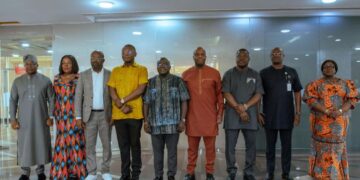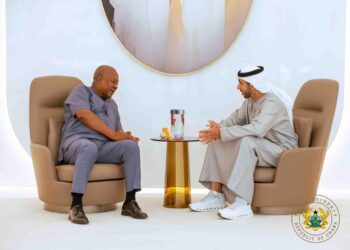Shamima Muslim, a veteran journalist and founder of the Alliance for Women in Media Africa, has taken a bold step into the public eye as a non-political activist.
In a recent appearance with the Gender, Children, and Social Protection Committee of the opposition National Democratic Congress (NDC), Shamima made a compelling case against the current administration’s handling of the economy.
The event, held in the Ashaiman Constituency, was led by human rights lawyer and former minister for gender, children, and social protection, Madam Nana Oye Bampoe Addo. It saw a significant turnout of elderly women and men, who gathered to hear Shamima’s impassioned speech.
Addressing the crowd, Shamima lamented the government’s perceived insensitivity and economic mismanagement, which she claimed has resulted in debt restructuring and financial cuts that have left many without their monthly incomes. Her critique was sharp and unambiguous, reflecting her deep concern for the plight of Ghana’s elderly citizens.
“In the practice of ethical journalism, we will no longer be on the side of neutrals in the face of wrongs against our elderly mothers and fathers who have worked all their lives for this nation. They contributed to building the foundations and progress of this nation and invested in government bonds with their pensions, yet they cannot access their money,” Shamima stated.
Her voice resonated with the audience as she described the distressing image of elderly citizens being forced to picket at the Ministry of Finance to demand the funds they have rightfully earned over a lifetime of hard work. “How can we allow our aged women and men to suffer such indignity?” she questioned.
Shamima’s appeal went beyond just highlighting the issues; she urged the elderly and all Ghanaians to take decisive action in the forthcoming elections. “The economic hardship in Ghana has reached an alarming rate,” she warned. “It is crucial that we make informed choices at the polls to ensure a better future for all.”
Her speech has sparked conversations across the nation, drawing attention to the urgent need for governmental accountability and economic reforms.
Shamima Muslim’s transition from journalist to activist marks a significant moment in Ghana’s socio-political landscape, as she leverages her platform to advocate for justice and equity.
The event concluded with a renewed sense of solidarity among the attendees, who expressed their support for Shamima’s call to action. As the nation moves closer to the next election cycle, her words are expected to resonate with many who are feeling the pinch of economic hardship.





































